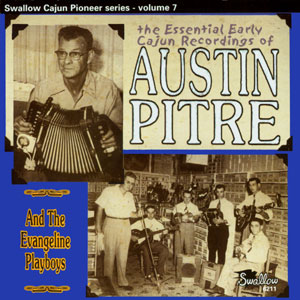Austin Pitre
“Accordion Firebrand of Ville Platte”
Quick Intro
Austin Pitre was a trailblazing Cajun accordionist and bandleader whose flamboyant style and powerful vocals helped define the sound of South Louisiana dancehalls. As frontman of the Evangeline Playboys, Pitre recorded extensively for Swallow Records, delivering classics like “Opelousas Waltz” and “Les Flumes d’Enfer” that remain staples of Cajun music to this day.
In-Depth Profile
Born on February 23, 1918, in Ville Platte, Louisiana, Austin Pitre began playing accordion at age six, gifted by his father who hoped to pass on the family’s musical tradition. By age 11, Austin was performing professionally alongside his father, often playing until dawn at local fais-do-dos. He later added fiddle to his repertoire, but it was the accordion that made him a legend.
In 1940, Pitre formed the Evangeline Playboys, and quickly became known for his theatrical performances—playing accordion behind his head, between his knees, and famously standing up without a shoulder strap. His energetic stage presence and raw vocal delivery made him a favorite across Louisiana’s dancehalls.
Pitre’s recordings with Swallow Records began in 1959 and continued through the 1960s, producing hits like “Opelousas Waltz,” “Lakeview Special,” and “Jungle Club Waltz.” His music combined driving accordion rhythms with steel guitar, fiddle, and drums, creating a sound that was both traditional and electrifying. He toured nationally and performed at the Smithsonian Festival of American Folk Life in 1973 and 1976.
In 1980, Pitre was honored at the Louisiana Freedom Festival for 50 years of contributions to Cajun music. He passed away on April 8, 1981, at his home in Elton, Louisiana.
Signature Tracks
- “Opelousas Waltz” — his most iconic recording, released by Swallow Records
- “Les Flumes d’Enfer” — fiery, fast-paced, and a Cajun dancehall staple
- “Lakeview Special” — accordion-driven swing with signature grit
Notable Accomplishments & Awards
- Recorded extensively for Swallow Records (1959–1981)
- Performed at the Smithsonian Festival of American Folk Life (1973, 1976)
- Honored at the Louisiana Freedom Festival (1980)
- Posthumously inducted into the CFMA Hall of Fame (1997)
Bonus Notes
- Claimed to be the first Cajun accordionist to play standing up
- Known for playing accordion behind his head and between his knees
- Owned an automotive repair shop near Ville Platte
Album Reviews
The Flames of Hell
BluesRag Magazine — Written by Dennis Rozanski (June–July 2009)
“Even if Austin Pitre did nothing more than fire up this blazing shot of Cajun hyperactivity, dancehall immortality still would have been granted.”
“The Flames of Hell” — even if Austin Pitre did nothing more during his hard knock life than fire up this blazing shot of Cajun hyperactivity, dancehall immortality still would have been granted. Because those fabled two-and-a-half minutes ended up launching an Acadian staple that’s nourished Saturday night setlists of countless Louisianan bands. However, Pitre’s legendary status rests on bedrock far sounder than one mega-influential song. There was the ability to power out dance-crazed melodies from an accordion, even if famously hoisted behind his head or tucked between his knees. There was that turpentine voice, capable of crushing the sensitive with its glorious paint-peeling powers and exclamatory shouts. There were his Evangeline Playboys, who’d pump the added thrust of rawhide fiddles, steel guitar, and drums into their boss’ brutal brilliance. And there is a catalog of unbridled performances, starting with these Swallow gems which include that historic 1959 cut, the muscle-bound swing of “Lakeview Special,” the airtight density of “J’ai Cogner a Ta Porte,” and the mournful momentum behind “Jungle Club Waltz.” Yet of all, “You’re the Only One for Me” slugs the hardest. It’s one of several rough-cut diamonds that haven’t seen the light of day until now. And it’s as close to perfection that a Cajun barroom blitz can get: accordion surging through the bandstand roar, French cries wildly puncturing the din, the cumulative loudness saturating the sound levels. But, then again, pretty much everything that Pitre did burned like hell.

